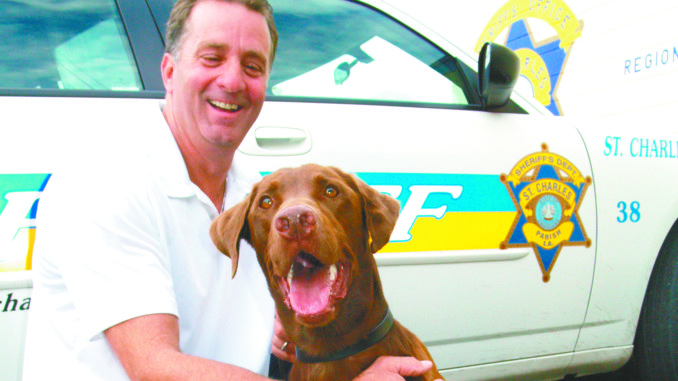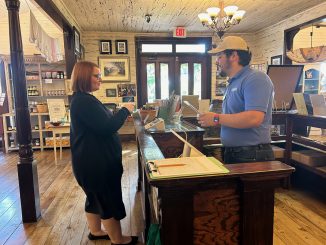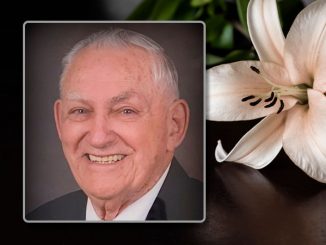
St. Charles Parish sheriff’s deputy Ricky Oubre rescues doomed dogs from shelters and turns them into heroes
Loco the Labrador retriever was just days away from lethal injection in an Ascension Parish animal shelter when narcotics agent Ricky Oubre got the call to save the pitiful dog’s life. The instant I saw him I could just tell he had been abused,” Oubre told the Herald-Guide.
“As I extended my hand to pat his head, he recoiled like he thought I was going to hit him.
“He cowered and actually tried to bury his head in his paws.”
Loco was then taken home to live with Oubre and his family.
“I had to allow him to be around my family so that he could feel loved. I had to make sure he was social.”
Oubre says once he was sure Loco had adjusted to his new home he began to train him for police work.
Oubre says Loco’s energy assured him that he would be an asset to the sheriff’s K-9 unit. “He adapted to my family really well, and he loved to play,” says Oubre.
“I would toss a ball and he would catch it. This ball seemed more important to him than food.”
Oubre calls this reaction ‘ball drive’ and says that it shows whether the dogs have what it takes to do the job.
“The dog is given a ball covered with the scent of a particular drug and these dogs are trained to go for the ball so that when they pick up the drug scent, the dog believes its going for its ball,” Oubre says. After Loco’s training he was released to another detective on the narcotics unit.
“Loco is now the responsibility of Mark Beard,” says Oubre. “ They’ve been together a few weeks now and are bonding quite well.
They are learning each other’s signals and this helps both of them to perform their jobs better.”
Oubre states that by allowing the officers to take the rescued dogs home it gives the officers and the animals a chance to bond with each other.
The dogs are provided kennels and supplies through the sheriff’s office and are released to the custody of the assigned officer.
“Loco lives with me. It is the only way I can get to know the dog and vice-versa,” Beard remarks.
The dogs Oubre rescues and trains come from animal shelters throughout southeastern “The instant I saw him I could just tell he had been abused,” Oubre told the Herald-Guide.
“As I extended my hand to pat his head, he recoiled like he thought I was going to hit him.
“He cowered and actually tried to bury his head in his paws.”
Loco was then taken home to live with Oubre and his family.
“I had to allow him to be around my family so that he could feel loved. I had to make sure he was social.”
Oubre says once he was sure Loco had adjusted to his new home he began to train him for police work.
Oubre says Loco’s energy assured him that he would be an asset to the sheriff’s K-9 unit. “He adapted to my family really well, and he loved to play,” says Oubre.
“I would toss a ball and he would catch it. This ball seemed more important to him than food.”
Oubre calls this reaction ‘ball drive’ and says that it shows whether the dogs have what it takes to do the job.
“The dog is given a ball covered with the scent of a particular drug and these dogs are trained to go for the ball so that when they pick up the drug scent, the dog believes its going for its ball,” Oubre says. After Loco’s training he was released to another detective on the narcotics unit.
“Loco is now the responsibility of Mark Beard,” says Oubre. “ They’ve been together a few weeks now and are bonding quite well.
They are learning each other’s signals and this helps both of them to perform their jobs better.”
Oubre states that by allowing the officers to take the rescued dogs home it gives the officers and the animals a chance to bond with each other.
The dogs are provided kennels and supplies through the sheriff’s office and are released to the custody of the assigned officer.
“Loco lives with me. It is the only way I can get to know the dog and vice-versa,” Beard remarks.
The dogs Oubre rescues and trains come from animal shelters throughout southeastern Louisiana including the animal shelter in Luling.
According to Lee Ann Matherne, director of the St. Charles Parish Animal Shelter Oubre has rescued several dogs. Matherne says, “Ricky comes out here pretty regularly and rescues Labador retrievers to do police work.”
Oubre would like to coordinate with the sheriff’s office and the school board to do a canine drug program in the schools.
“It’s just an idea,” Oubre says, “St. John Parish has the canine program in their school system and they are doing well.”
The program would involve the use of dogs to walk the hallways of schools to sniff out drugs.
Matherne’s shelter picks up about 200 animals a month and about half are adopted. Since Hurricane Katrina, about 500 animals have been shipped out as far across the country as California to rescue areas.




Be the first to comment